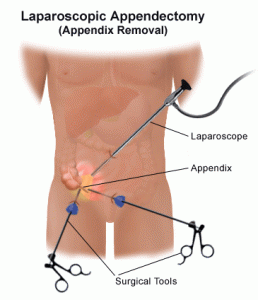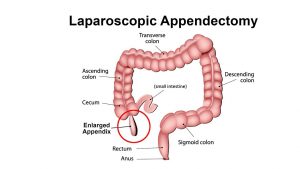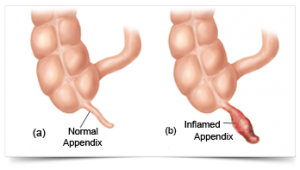CALL TODAY 646-846-1136 | EMAIL
Laparoscopic appendectomy – NYC General Surgeon
Laparoscopic appendectomy: Steps, Benefits, Side-Effects, Precautions & Prognosis
 The procedure of surgically removing the narrow, elongated tube attached to the colon-known as an appendix when it becomes diseased, inflamed or infected (appendicitis) is called appendectomy. It is normally carried out on an emergency basis as swollen appendicitis could burst if not excised, causing the clogged stool and bacteria to spread. It would eventually infect other gastrointestinal organs and lead to peritonitis-a life-threatening condition. A ruptured appendix could also create an abdominal abscess which is also a grave condition that could endanger your life.
The procedure of surgically removing the narrow, elongated tube attached to the colon-known as an appendix when it becomes diseased, inflamed or infected (appendicitis) is called appendectomy. It is normally carried out on an emergency basis as swollen appendicitis could burst if not excised, causing the clogged stool and bacteria to spread. It would eventually infect other gastrointestinal organs and lead to peritonitis-a life-threatening condition. A ruptured appendix could also create an abdominal abscess which is also a grave condition that could endanger your life.
Steps
Generally, two kinds of appendectomy are carried out to do away with appendicitis:
- The traditional ‘open appendectomy’
- Laparoscopic appendectomy (a more advanced form of surgery)
 Open appendectomy is more suitable for patients whose appendices have split open and also for those who have undergone abdominal surgery before.
Open appendectomy is more suitable for patients whose appendices have split open and also for those who have undergone abdominal surgery before.
A laparoscopic appendectomy, on the other hand, involves accessing the appendix via three tiny incisions or openings made in the lower abdomen. A cannula filled with carbon dioxide (a slender and small tube) is inserted through the openings for inflating the abdomen following which a laparoscope is slotted in.
A high-resolution camera fixed at the head of the laparoscope transmits the image to a display screen. The displayed images will clearly show the precise location of the appendix which in turn will help the surgeon to channelize the surgical instruments for ligation (of the appendix) and excising it. Keyhole surgery usually resorts if the patient happens to be overweight and aged.
Benefits
The specific benefits of laparoscopic appendectomy vary from one patient to another, depending upon his or her condition. Nevertheless, the common benefits entail:
- Short stay in the hospital
- Reduced postoperative pain
- Faster restoration of normal bowel function
- Speedier return to a normal lifestyle
Side Effects
The associated risk factors or complications are more or less the same for both laparoscopic appendectomy and open appendectomy. Following are some common side effects:
- Bleeding from the operated site
- Seepage from the colonic edge, especially at the juncture from where it was ligatured and removed
- Clotting of the blood vessels in the deeper venous layer and the clots getting transported to the lungs causing pulmonary embolism which could turn fatal
- Increased likelihood of the urinary bladder, ureter, large and small intestines suffering injury
- Heightened risk of infection
Precautions
 Once you’re through with the surgery, you’ll need to abide by the surgeon’s instructions to stay safe and secure. Your surgeon will generally list the following instructions and precautions:
Once you’re through with the surgery, you’ll need to abide by the surgeon’s instructions to stay safe and secure. Your surgeon will generally list the following instructions and precautions:
- Walking from the day following the surgery to minimize chances of muscle soreness and blood clots
- Taking the prescribed medications on time and completing the medicine course
- Cleaning the incisions regularly to prevent infection risks
- Watching out for symptoms of infection diarrhea, abdominal cramps, and inflammation in the incisions and reporting the same to your physician immediately
Prognosis
Most patients convalesce from appendicitis within 4-5 weeks of the conduction of laparoscopic appendectomy. Nevertheless, a very slim chance of getting infected is always present.
Concluding Remarks
Laparoscopic appendectomy is generally resorted to when there is imminent risk of the inflamed appendix bursting open. The risks related to leaving appendicitis untreated are remarkably grave and could endanger the affected individual’s life. For complete information on laparoscopic appendix surgery of the appendix, you can contact our general surgeon and make an appointment with him for possible surgery.
References
- https://www.sages.org/publications/patient-information/patient-information-for-laparoscopic-appendectomy-from-sages/
- https://www.healthline.com/health/appendectomy#recovery
- https://www.hopkinsmedicine.org/healthlibrary/test_procedures/gastroenterology/appendectomy_92,P07686
- https://www.everydayhealth.com/appendicitis/guide/appendectomy/
- https://www.findatopdoc.com/Healthy-Living/Everything-You-Need-to-Know-About-an-Appendectomy
- https://www.cochrane.org/CD006437/COLOCA_determining-optimal-method-securely-closing-base-appendix-during-keyhole-surgery-after-removal
- https://www.healthpages.org/surgical-care/what-kind-surgeon/
- https://www.cochrane.org/CD006437/COLOCA_determining-optimal-method-securely-closing-base-appendix-during-keyhole-surgery-after-removal

